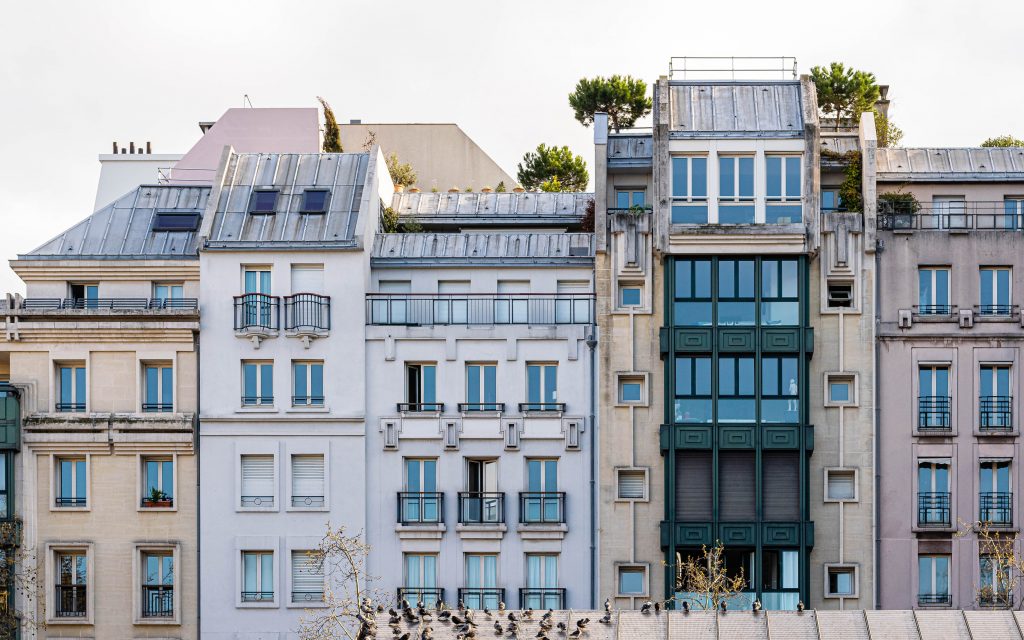Life in Paris is living in one of the world’s most dynamic metropolises! There are typically two paths to take regarding your new home in Paris, depending on whether the stay is short or long-term.
Apartments in Paris can be rented or purchased just like anywhere else. It’s up to you to decide whether you’d rather rent an apartment on a short-term basis or buy it for a longer period of time and investment.
Here, we’ll go over some guidelines to help you make better choices as you search for your home in Paris!
Cost of living in Paris: should you buy or rent?

Apartment rentals are very common in Paris and the rest of France. As a matter of fact, 36% of the French population does not own a home, instead opting to rent apartments, houses, or condos.
Why? It is a significant financial commitment to purchase a Parisian apartment. Price tags can range from €500,000 to €1,000,000. Unless you plan to make Paris your (semi) permanent home, renting is probably your best bet.
People in Paris enjoy a high standard of living at a reasonable cost. Depending on the apartment’s location, style, furnishings, etc., the monthly rent for a two-bedroom unit can range from three thousand to ten thousand euros. A one-room apartment can be found for around €1000.
Let’s talk about the steps you should take to secure a Paris apartment:
1. Determine your costs and create a plan
First of all, the price really depends on how big your living space is, and whether the apartment comes furnished. You will save yourself a lot of time by deciding on your budget in advance, and not going back and forth between options.
Although a penthouse with a view of the Eiffel Tower would certainly be appealing, only a select few can afford that.
In Paris, a security deposit is always expected when renting an apartment or other property. A security deposit is money given to a landlord to cover the cost of any repairs that may be necessary because of the tenant.
Our tip: obtain a written état des lieux inspection report from a qualified third party. This will protect you from being charged for any pre-existing damage in the apartment.

Parisian apartments, like many European rentals, charge a range of monthly fees for amenities like garbage disposal, gas, water, and other administrative fees.
Your apartment’s upkeep may be included in your rent or you may be responsible for it, depending on the terms of your lease (known as a collectif). Always be sure of this amount before signing the contract and moving in. Nobody wants to put down a lot of money and then discover there’s a hidden fee added on.
2. Decide on location
Once you know how much money you have to spend on an apartment in Paris, you can begin your search for a suitable neighborhood.
It’s preferable to live in an area with a shorter commute. Finding a Paris apartment in close proximity to your place of study or employment is highly recommended.
Across the banks of the Seine River, Paris is subdivided into 20 arrondissements. District 1 is located in the middle of the snail-shaped districts.

In this area is where you’ll find the world-famous Louvre museum. Price reductions are typical as one travels farther away from the central business district.
If you’re unable to find an affordable apartment in Paris, aim to find one that’s conveniently located near public transportation options like the metro, tram, and RER trains.
The time and money you save will add up in the long run.
3. Finding the perfect apartment
After settling on a spending plan and a rough idea of the neighborhood you’d like to call home, it’s time to start looking for apartments and finding one that’s right for you.
There are three ways to find an apartment to rent in Paris.
Let’s break down your choices.
– Investigate a few real estate agencies
Those without a reliable source of monthly income should avoid starting with a real estate agency.
Real estate agencies and property broker agents largely target renters who can afford to spend more than $2,400 per month. Since their pay is based on commission, they try to steer clear of customers who are only interested in finding the cheapest possible options.
Most Parisian renters avoid using real estate agents because their commissions can range from €300 to €500.
SeLogger is a website that features listings from many different real estate agencies. You can look through the available options to see if anything meets your requirements. If you can’t find an apartment that fits your needs and price range, the website can still be useful for gathering information about rental rates in the neighborhoods of your choice.

– Peruse online listings
Since 2015, Airbnb has offered listings for monthly rentals. You can find beautiful, fully-furnished apartments all over Paris by using Airbnb.
The fact that the Airbnb platform acts as a go-between for tenants and landlords is a major perk when renting on a monthly basis. You can quickly and easily discuss the details of your stay through the Airbnb app before committing to a booking, and you can also check out a full list of the included services.
These rentals, like many other high-quality options, may come at a higher price than you’d like. Even if you look at a number of real estate listings, you still might not find the perfect place.
Apartments can also be found and rented through Particulier à Particulier, another website that connects tenants with landlords. Without the mediation of a middleman (such as a broker or agency), you can deal directly with the owner. Most brokers and agencies charge a commission fee for mediating a lease or purchase agreement, but if you find someone and rent directly from them, you can save that money.
Facebook is another great tool for finding available Parisian rental apartments. Facebook is home to countless communities of both landlords and tenants. Get notified the moment a new rental in Paris becomes available by joining one of these groups and activating notifications.
– Independent contract
You, as the tenant, and the landlord, as the independent contractor, are directly obligated to each other under the terms of the contract. On the plus side, you could potentially save money on broker and agency commissions, but you’d have to handle any plumbing or construction issues that arise on your own.
Landlords are naturally wary of signing leases with non-native speakers of the language, making it difficult for foreigners to secure independent contracts. Many people, including some who were born and raised in France, will compete with you for apartments that are available on individual contracts because of the lower rent.
– Prepare your paperwork
A dossier (paperwork) must be prepared in order to enter into a legal agreement with a landlord in France, regardless of whether you choose to rent an apartment independently, through an online listing, or with the assistance of a professional real estate agency. The following documents are required for any rental agreement to be effective in France:
Your dossier’s specific requirements will be determined by the type of visa you hold.
- Scanned form of your ID (passport, French ID, etc.)
- French guarantor
- Proof of source of income
You may have trouble finding a French guarantor if you are a non-French speaker. Find a reliable individual who is willing to sign your agreement and serve as guarantor by using GarantMe.fr.
To show that you can afford the rent, you will be required to submit copies of your most recent three fiches de paies (pay slips), or pay stubs, whether you are employed in France or for a company based outside of France.
If you are still a student, you will have to demonstrate financial support from a source outside of France. Your financiers will need to provide documentation of where the money is coming from and will need to sign a document attesting to the fact that they will be financially responsible for your lease in France for the duration of your studies there.

– Signing the lease & moving in
If you’ve come this far, you deserve a big pat on the back!
Your next step should be to protect your newly rented apartment from any unanticipated mishaps or damages by purchasing renter’s insurance. Having your apartment insured can help alleviate a lot of stress. You must have Assurance d’Habitation. For example, a monthly subscription to Luko.eu costs about $7.
It’s possible that you’ll need to upgrade your apartment’s internet service. Options in Paris begin at €29.99 per month with providers like Bouygues and Orange.
Renting in Paris can seem like a mountain to climb. If that’s what you really want, and your journey in Paris will not be a short adventure, in the end it’s worth it. Take care to adhere to the RDR: regulations, documentation, and requirements.
…Or just experience coliving
However, if you find that just thinking about all of this is too much, coliving may be the solution for you.
You won’t have to set up the internet or the furniture, and there is some leeway in the required paperwork.
In addition to saving money, sharing a home in Paris is a great way to explore the city’s various neighborhoods before settling down.








Leave a comment